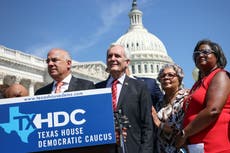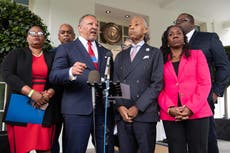Why did Texas Democrats leave the state? The fight for voting rights, explained
Texas lawmakers broke quorum in their state’s legislature to block GOP elections bills. They’ll stay in Washington DC for nearly a month to urge Congress to protect voting rights
A group of Democratic state lawmakers from Texas have arrived in Washington DC, where they plan to stay in a last-ditch effort to block passage of Republican-sponsored legislation that could undermine the right to vote in the state.
GOP lawmakers in at least 48 states have introduced nearly 400 bills this year to undermine the right to vote, part of a coordinated campaign in the wake of 2020 elections to curtail mail-in voting and early voting options after record-high turnouts and Republican losses.
At least 28 of those bills have been signed into law in 17 states.
In Texas, proposals would ban early voting options that proved popular in the state’s massive counties during the coronavirus pandemic and embolden partisan poll watchers to harass election workers, among other measures.
While they’re in Washington DC, Texas Democrats are meeting with Vice President Kamala Harris and members of Congress to push for sweeping federal voting rights protections while stressing that their time is running out – the special legislative session to consider the Texas bills will end next month, and Republican Governor Greg Abbott has vowed to bring the legislature into session as many times as it takes to see his agenda passed.
How did it come to this?
GOP lawmakers across the US have proposed rolling back mail-in voting and early voting options, imposing restrictive voter ID laws, criminalising handing out food and water at the polls, punishing elections officials for promoting voting campaigns, and stripping election oversight from nonpartisan election authorities and putting it into the hands of Republican lawmakers, among other measures.
The bills have been introduced under the guise of protecting “election integrity” and ensuring “voter confidence” despite overwhelming turnout in 2020 elections and no evidence of widespread vote fraud, against the baseless narrative promoted by Donald Trump and his allies.
Governor Abbott and state Republicans have prioritised similar legislation, but in May, House Democrats in Texas staged a walkout to prevent its passage.
In retaliation, Governor Abbott vetoed a portion of the state budget that funds the state legislature, its staff and agencies.
Following the closure of the regular legislative session, the governor called a special session, rolling out a list of 11 legislative priorities – from his voting legislation to bills aimed at “critical race theory” and prohibiting transgender athletes from school sports – that he urged lawmakers to pass and bring to his desk.
The special session ends on 8 August, and Texas Democrats plan to stay in the nation’s capital at least until its end.
Governor Abbott said he will “call a special session after special session after special session all the way up until election next year” to pass his agenda.
He has also pledged to arrest Democrats when they return – something he does not have authority to do, though lawmakers could be detained and forced to return to their respective chambers to achieve a quorum.
What is in the bills?
Texas Republicans backed away from several proposals that drew international criticism, including provisions that would have shut down many urban polling precincts and end early voting on Sunday mornings – a measure that would potentially hurt voter turnout among Black churches that sponsor “souls to the polls” campaigns after church services.
But the new legislation proposes other restrictive measures that could undermine ballot access and embolden partisan poll watchers to intimidate election workers.
Following a wave of disruptive partisan poll watchers antagonising election workers in 2020, the Texas bill would make it harder to remove them, and election workers could face potential jail time if they “intentionally or knowingly refuse to accept a watcher for service when acceptance of the watcher is required by this section.”
The legislation also proposes harsh criminal penalties against election workers and would-be voters for minor infractions that could be caused by error.
It also would add new restrictions for those who assist others in casting ballots, a provision criticised by disability advocates, and ban “drive-thru” voting pioneered by Harris County – one of the largest counties in the nation. It would also add restrictive ID requirements for sending mail-in ballots and ban the distribution of mail-in ballot applications.
Despite nine Democrats missing from the Senate on 13 July, that chamber’s bill passed.
What does it mean to break quorum?
At least 100 members of the 150-member House chamber in Texas must be present to conduct legislative business, and 21 of the 31-seat Texas Senate must be present in that chamber.
At least 51 of the 67 Democratic members of the Texas House of Representatives left the state on 12 July, many of them boarding chartered planes bound for the nation’s capital.
At least 57 letters have been sent to the House clerk with instructions to lock their voting machines.
Texas Republicans have said they will use the “call of the House” to allow law enforcement to drag Democrats back to their respective chambers to achieve a quorum.
Have they done this before?
Texas Democrats left for Oklahoma in 2003 – during another voting rights battle – in an effort to block Republican redistricting plans that sparked several lawsuits and a decision from the US Supreme Court.
The GOP-led drafting of congressional districts gave Republicans a majority of the state’s House seats for the first time since Reconstruction.
After Democrats successfully blocked its passage, then Governor Rick Perry called a special session, prompting Democrats to travel to New Mexico, but they eventually returned and the legislation passed.
Why Washington?
Democrats are lobbying members of Congress to pass critical voting rights legislation, including the For The People Act, which was blocked in a Republican-led filibuster in the Senate, and a restoration of the Voting Rights Act to be named in honour of late civil rights leader and congressman John Lewis.
Senate Minority Leader Mitch McConnell has vowed to block that, too.
The US Supreme Court has also upheld two Arizona laws that voting rights advocates argued have disproportionately hurt minority voters – the high court’s second decision in the last decade to undermine a portion of the landmark Voting Rights Act.
If passed, the John Lewis Voting Rights Act would restore federal “preclearance” provisions – stripped from the Voting Rights Act by the Supreme Court in 2013 – that prohibit states with histories of racially discriminatory voting laws from passing new ones without federal oversight.
The For The People Act is a sweeping voting rights, election ethics and campaign finance reform bill that could mark one of the largest expansions of voting rights in the US, if passed. Democrats see it as a vital antidote to GOP-backed elections laws.
The bill would, among other things, create automatic voter registration, mandate at least 15 consecutive days of early voting for federal elections, and standardise mail-in voting and drop boxes for absentee ballots.
Despite control of the US House and the White House, filibuster rules in the Senate require a two-thirds majority, or at least 60 votes in the evenly divided chamber, to move legislation forward.
With a 50-50 makeup of Democrats and Republicans, the GOP has effectively obstructed Democrats’ agenda twice in the current Congress – by blocking consideration of the For The People Act and a bipartisan commission to study the riot at the US Capitol on 6 January, an attack fuelled by the same “stolen election” narrative behind much of the GOP legislation across the US.
Voting rights advocates and a growing number of Democratic lawmakers have pressed Senate Democrats to abolish entirely or at least create a “carve out” for voting rights in the filibuster rules. That could allow Democrats to advance that legislation with a simple majority vote, with a tie-breaking vote from the vice president.
A handful of Senate Democrats – including Joe Manchin and Kyrsten Sinema – have vocally opposed doing so.
Joe Biden assailed the state of voter suppression legislation across the US in an address from Philadelphia on 13 July, but the president has not rallied Democrats around amending Senate filibuster rules, despite his insistence that protecting and expanding voting remains remains a “test of our time” and a definitive battle for his term.
Join our commenting forum
Join thought-provoking conversations, follow other Independent readers and see their replies
Comments




Bookmark popover
Removed from bookmarks